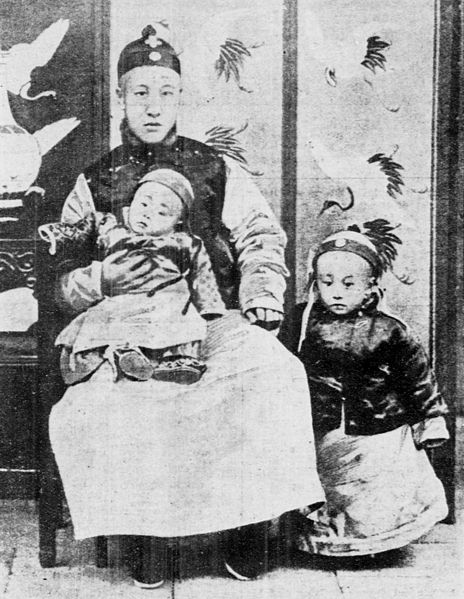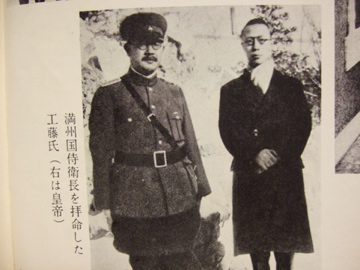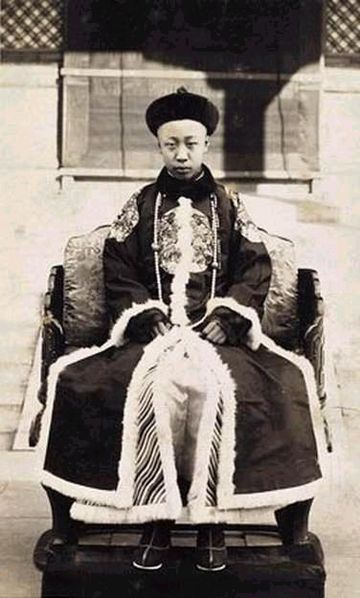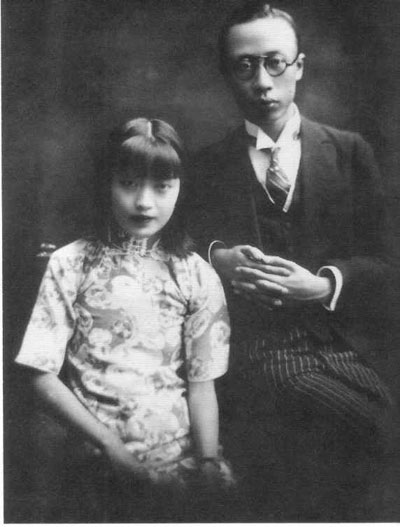<Back to Index>
- Qing Emperor of China Puyi, 1906
PAGE SPONSOR

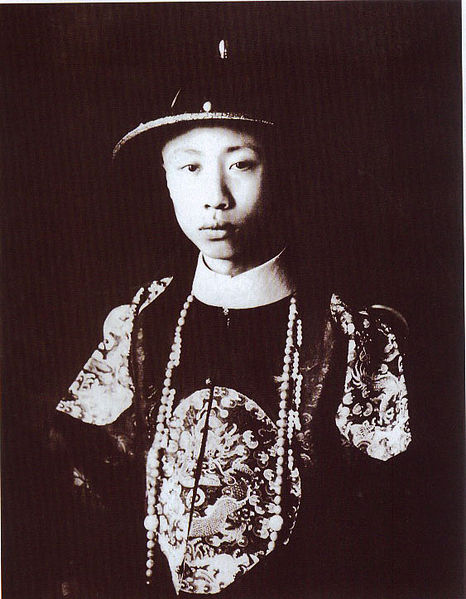
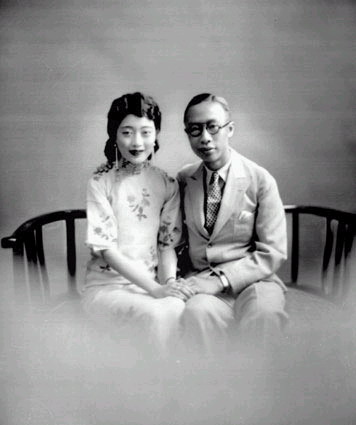
Puyi (7 February 1906 – 17 October 1967), of the Manchu Aisin Gioro clan, was the last Emperor of China, and the twelfth and final ruler of the Qing Dynasty. He ruled as the Xuantong Emperor from 1908 until his abdication on 12 February 1912. From 1 to 12 July 1917 he was briefly restored to the throne as a nominal emperor by the warlord Zhang Xun. In 1934 he was declared the Kangde Emperor of the puppet state of Manchukuo by the Empire of Japan, and he ruled until the end of the Second Sino - Japanese War in 1945. After the People's Republic of China was established in 1949, Puyi was a member of the Chinese People's Political Consultative Conference from 1964 until his death in 1967. Puyi's abdication in 1912 marked the end of centuries of dynastic rule in China, and he is also widely known as The Last Emperor.
Puyi's name is romanized in English as either Puyi (in pinyin) or P'u-i (in Wades - Giles). This naming is in accordance with the Manchu tradition of avoiding the use of a person's clan name and given name together, but is in complete contravention of Chinese tradition, whereby the given name of a ruler was considered taboo and ineffable. Using a former emperor's personal name (or even using a Chinese character from the name) was a punishable offense under traditional Chinese law. However after Puyi lost his imperial title in 1924, he was officially styled Mr. Puyi (simplified Chinese: 溥仪先生; traditional Chinese: 溥儀先生; pinyin: Pǔyí Xiānshēng) in Chinese and Mr. Fugi (溥儀先生; Fugi Sensei) in Japanese. His clan name Aisin Gioro (simplified Chinese: 爱新觉罗; traditional Chinese: 愛新覺羅; pinyin: Àixīn Juéluó) was seldom used.
Puyi also adopted Chinese style names - his zi (字; courtesy name) was Yaozhi (Chinese: 耀之; pinyin: Yàozhī), and his hao (號; pseudonym) was Haoran (Chinese: 浩然; pinyin: Hàorán).
Puyi is also known to have used a Western given name, Henry, which was chosen by his English language teacher, a Scotsman named Reginald Johnston.
When he ruled as Emperor of the Qing Dynasty from 1908 to 1912 and during his brief restoration in 1917, Puyi's era name was Xuantong, so he was known as the Xuantong Emperor (simplified Chinese: 宣统皇帝; traditional Chinese: 宣統皇帝; pinyin: Xuāntǒng Huángdì) during those two periods of time.
As Puyi was also the last ruling Emperor of China, he is widely known as The Last Emperor (Chinese: 末代皇帝; pinyin: Mòdài Huángdì) in China and throughout the rest of the world. Some refer to him as The Last Emperor of the Qing Dynasty (Chinese: 清末帝; pinyin: Qīng Mò Dì).
Due to his abdication, Puyi is also known as Xun Di (simplified Chinese: 逊帝; traditional Chinese: 遜帝; pinyin: Xùn Dì; literally "Yielded Emperor") or Fei Di (simplified Chinese: 废帝; traditional Chinese: 廢帝; pinyin: Fèi Dì; literally "Abrogated Emperor"). Sometimes a Qing (Chinese: 清; pinyin: Qīng) is added in front of the two titles to indicate his affiliation with the Qing Dynasty.
When Puyi ruled the puppet state of Manchukuo from 1934 to 1945, his era name was Kangde, so he was known as the Kangde Emperor (Chinese: 康德皇帝; pinyin: Kāngdé Huángdì) during that period of time.
Puyi's great - grandfather was the Daoguang Emperor (r. 1820 – 1850), who was succeeded by his fourth son, the Xianfeng Emperor (r. 1850 – 1861).
Puyi's paternal grandfather was 1st Prince Chun (1840 – 1891), the seventh son of the Daoguang Emperor and a younger half - brother of the Xianfeng Emperor. The Xianfeng Emperor was succeeded by his only son, who became the Tongzhi Emperor (r. 1861 – 1875).
The Tongzhi Emperor died at the age of 18 without a son, and was succeeded by the Guangxu Emperor (r. 1875 – 1908), son of 1st Prince Chun and Lady Yehenara Wanzhen (younger sister of Empress Dowager Cixi). The Guangxu Emperor died without an heir.
Puyi, who succeeded the Guangxu Emperor, was the eldest son of 2nd Prince Chun, who was born to 1st Prince Chun and his second concubine Lady Lingiya (1866 - 1925). Lady Lingiya used to be a maid in the residence of 1st Prince Chun. Born a Han Chinese, her original family name was Liu (劉), and this was changed to the Manchu clan name Lingiya when she became the concubine of 1st Prince Chun. 2nd Prince Chun was therefore a younger half - brother of the Guangxu Emperor and the first in line to succession after Guangxu.
Puyi was in a branch of the Aisin Gioro clan with close ties to Empress Dowager Cixi, who was from the Yehenara clan. Cixi's niece, who later became Empress Dowager Longyu (1868 – 1913), was married to the Guangxu Emperor.
Puyi had a younger full brother, Pujie (1907 – 1994), who married a cousin of Emperor Hirohito, Lady Hiro Saga. The rules of succession were changed to allow Pujie to succeed Puyi, who had no children.
Puyi's last surviving younger half - brother Puren (b. 1918) has adopted the Chinese name Jin Youzhi and currently still lives in China. In 2006 Jin Youzhi filed a lawsuit in regards to the rights to Puyi's image and privacy. The lawsuit claimed that those rights were violated by the exhibit "China's Last Monarch and His Family".
Puyi's second cousin, Pu Xuezhai (溥雪齋), was a musician who played the guqin, and an artist of Chinese painting.
Puyi's mother was 2nd Princess Chun (1884 – 1921), the daughter of Ronglu (1836 – 1903), a statesman and general from the Guwalgiya clan. Ronglu was one of the leaders of the conservative faction in the Qing court, and a staunch supporter of Empress Dowager Cixi; Cixi rewarded his support by marrying his daughter, Puyi's mother, into the imperial family.
The Guwalgiya clan was regarded as one of the most powerful Manchu clans in the Qing Dynasty. Oboi, an influential military commander and statesman who was a regent during the Kangxi Emperor's reign, was from the Guwalgiya clan.
Chosen by Empress Dowager Cixi on her deathbed, Puyi became emperor at the age of 2 years and 10 months in December 1908 after the Guangxu Emperor died on 14 November. Titled the Xuantong Emperor, Puyi's introduction to the life of an emperor began when palace officials arrived at his family residence to take him. The toddler Puyi screamed and resisted as the officials ordered the eunuch attendants to pick him up. His father, 2nd Prince Chun, became Prince - Regent (摄政王). During Puyi's coronation in the Hall of Supreme Harmony, the young emperor was carried onto the throne by his father. Puyi was so frightened by the scene before him and the deafening sounds of ceremonial drums and music that he started crying. His father could do nothing except to quietly comfort him, "Don't cry, it'll be over soon."
Puyi's wet nurse, Wen - Chao Wang, was the only one who could console him, and therefore she accompanied him to the Forbidden City. Puyi would not see his biological mother, 2nd Princess Chun, for the next seven years. He developed a special bond with Wen - Chao Wang and credited her with being the only person who could control him. She was sent away when he was eight years old. After Puyi married, he would occasionally bring her to the Forbidden City, and later Manchukuo, to visit him. After his special government pardon in 1959, he visited her adopted son and only then learned of her personal sacrifices to be his nurse.
Puyi's upbringing was hardly conducive to the raising of a healthy, well balanced child. Overnight, he was treated as a god and unable to behave as a child. The adults in his life, except for his wet nurse Wen - Chao Wang, were all strangers, remote, distant, and unable to discipline him. Wherever he went, grown men would kneel down in a ritual kowtow, averting their eyes until he passed. Soon the young Puyi discovered the absolute power he wielded over the eunuchs, and he frequently had them beaten for small transgressions. Quotation of Puyi:
| “ | No account of my childhood would be complete without mentioning the eunuchs. They waited on me when I ate, dressed and slept; they accompanied me on my walks and to my lessons; they told me stories; and had rewards and beatings from me, but they never left my presence. They were my slaves; and they were my earliest teachers. | ” |
After his marriage, Puyi began to take control of the palace. He described "an orgy of looting" taking place that involved "everyone from the highest to the lowest". According to Puyi, by the end of his wedding ceremony, the pearls and jade in the empress's crown had been stolen. Locks
were broken, areas ransacked, and on June 27, 1923, a fire destroyed
the area around the Palace of Established Happiness. Puyi suspected it
was arson to cover theft. The emperor overheard conversations among the
eunuchs that made him fear for his life. In response, he evicted the
eunuchs from the palace. His next plan of action was to reform the Household Department; the
officials of which he appointed became so wealthy from theft and graft
that they were able to run their own businesses outside the palace.
Puyi's father, 2nd Prince Chun, served as a regent until 6 December 1911 when Empress Dowager Longyu took over in the face of the Xinhai Revolution.
Empress
Dowager Longyu endorsed the "Imperial Edict of the Abdication of the
Qing Emperor" (清帝退位詔書) on 12 February 1912, following the Xinhai Revolution, under a deal brokered by Yuan Shikai (a general of the Beiyang Army) with the imperial court in Beijing and the Republicans in southern China. Signed with the new Republic of China, Puyi was to retain his imperial title and be treated by the government of the Republic with the protocol attached to a foreign monarch. This was similar to Italy's Law of Guarantees (1870) which accorded the Pope certain honors and privileges similar to those enjoyed by the King of Italy. Puyi and the imperial court were allowed to remain in the northern half of the Forbidden City (the Private Apartments) as well as in the Summer Palace. A hefty annual subsidy of four million silver taels was
granted by the Republic to the imperial household, although it was
never fully paid and was abolished after just a few years.
The document is dated 26 December 1914.
- After the abdication of the Great Qing Emperor, his title of dignity is to be retained by the Republic of China with the courtesies which it is customary to accord to foreign monarchs.
- After the abdication of the Great Qing Emperor, he will receive from the Republic of China an annual subsidy of 4,000,000 silver taels. After the reform of the currency this amount will be altered to $4,000,000 (mex.).
- After the abdication of the Great Qing Emperor, he may, as a temporary measure, continue to reside in the Palace (in the Forbidden City), but afterwards he will remove himself to the Summer Palace. He may retain his bodyguard.
- After the abdication of the Great Qing Emperor, the temples and mausoleums of the imperial family with their appropriate sacrificial rites shall be maintained in perpetuity. The Republic of China will be responsible for the provision of military guards for their adequate protection.
- As the Chong Mausoleum (崇陵) of the late Emperor Dezong (the Guangxu Emperor) has not yet been completed, the work will be carried out according to the proper regulations (relating to imperial tombs). The last ceremonies of sepulture will also be observed in accordance with the ancient rites. The actual expenses will all be borne by the Republic of China.
- The services of all the persons of various grades hitherto employed in the Palace may be retained; but in future no eunuchs are to be added to the staff.
- After the abdication of the Great Qing Emperor, his private property will be safeguarded and protected by the Republic of China.
- The imperial guard corps as constituted at the time of the abdication will be placed under the military control of the War Office of the Republic of China. It will be maintained at its original strength and will receive the same emoluments as heretofore.
In 1917 the warlord Zhang Xun restored Puyi to the throne from July 1 to July 12. Zhang Xun ordered his army to keep their queues to display loyalty to the emperor. During that period of time, a small bomb was dropped over the Forbidden City by a Republican plane, causing minor damage. This is considered the first aerial bombardment ever in East Asia. The restoration failed due to extensive opposition across China, and the decisive intervention of another warlord, Duan Qirui.
Puyi was expelled from the Forbidden City in 1924 by the warlord Feng Yuxiang.
Following his expulsion from the Forbidden City, Puyi spent a few days at the house of his father 2nd Prince Chun, and then temporarily resided in the Japanese embassy for a year and a half. In 1925, he moved to the Quiet Garden Villa in the Japanese Concession in Tianjin. During this period, Puyi and his advisers Chen Baochen, Zheng Xiaoxu and Luo Zhenyu discussed
plans to restore Puyi as Emperor. Zheng and Luo favored enlisting
assistance from external parties, while Chen opposed the idea. In
September 1931 Puyi sent a letter to Jirō Minami, the Japanese Minister of War, expressing his desire to be restored to the throne. He was visited by Kenji Doihara, head of the espionage office of the Japanese Kwantung Army, who proposed establishing Puyi as head of a Manchurian state. In November 1931, Puyi and Zheng Xiaoxu traveled to Manchuria to complete plans for the puppet state of Manchukuo. The Chinese government ordered Puyi's arrest for treason, but was unable to breach the Japanese protection. Chen Baochen returned to Beijing where he died in 1935.
On 1 March 1932, Puyi was installed by the Japanese as the ruler of Manchukuo, considered by most historians as a puppet state of the Empire of Japan, under the reign title Datong (大同). In 1934, he was officially crowned the emperor of Manchukuo under the reign title Kangde (康 德). He was constantly at odds with the Japanese in private, though submissive in public. He resented being "Head of State" and then "Emperor of Manchukuo" rather than being fully restored as a Qing Emperor. Puyi lived in a palace (now the Museum of the Imperial Palace of the Manchu State) in this period. At his enthronement he clashed with Japan over dress; they wanted him to wear a Manchukuo style uniform whereas he considered it an insult to wear anything but traditional Manchu robes. In a typical compromise, he wore a Western military uniform to his enthronement (the only Chinese emperor ever to do so) and a dragon robe to the announcement of his accession at the Temple of Heaven.
Puyi's younger full brother Pujie, who married Lady Hiro Saga, a distant cousin to the Japanese Emperor Hirohito, was proclaimed heir apparent. The marriage had been politically arranged by Shigeru Honjō, a general of the Kwantung Army. Puyi thereafter would not speak candidly in front of his brother and refused to eat any food provided by Hiro Saga. Puyi was forced to sign an agreement that if he himself had a male heir, the child would be sent to Japan to be raised by the Japanese.
From 1935 to 1945 Kwangtung Army senior staff officer Yasunori Yoshioka was assigned to Puyi as Attaché to the Imperial Household in Manchukuo. He acted as a spy for the Japanese government, controlling Puyi through fear, intimidation, and direct orders. There were many attempts on Puyi's life during this period, including a 1937 stabbing by a palace servant. During Puyi's reign as Emperor of Manchukuo, his household was closely watched by the Japanese, who increasingly took steps toward the full Japanization of Manchuria, to prevent him from becoming too independent. He was feted by the Japanese populace during his visits there, but had to remain subservient to Emperor Hirohito. It is unclear whether the adoption of ancient Chinese styles and rites, such as using "His Majesty" instead of his real name, was the product of Puyi's interest or a Japanese imposition of their own imperial house rules.
During these years, Puyi began taking a greater interest in traditional Chinese law and religion (such as Confucianism and Buddhism),
but this was disallowed by the Japanese. Gradually his old supporters
were eliminated and pro - Japanese ministers put in their place. During
this period Puyi's life consisted mostly of signing laws prepared by
Japan, reciting prayers, consulting oracles, and making formal visits
throughout his state.
At the end of World War II, Puyi was captured by the Soviet Red Army on 16 August 1945 while he was in an airplane fleeing to Japan. The Soviets took him to the Siberian town of Chita. He lived in a sanatorium, but was later taken to Khabarovsk near the Chinese border.
In 1946, he testified at the International Military Tribunal for the Far East in Tokyo, detailing his resentment of how he had been treated by the Japanese.
When the Chinese Communist Party under Mao Zedong came to power in 1949, Puyi was repatriated to China after negotiations between the Soviet Union and China. Puyi spent ten years in a Fushun War Criminals Management Centre, except during the Korean War he was taken to Harbin where he spent three years until 1954 because Fushun was near the Korean border, in Liaoning province, until he was declared reformed. Puyi came to Beijing in 1959 with special permission from Chairman Mao Zedong and lived the next six months in an ordinary Beijing residence with his sister before being transferred to a government sponsored hotel. He voiced his support for the Communists and worked at the Beijing Botanical Gardens. At the age of 56, he married Li Shuxian, a hospital nurse, on 30 April 1962, in a ceremony held at the Banquet Hall of the Consultative Conference. He subsequently worked as an editor for the literary department of the Chinese People's Political Consultative Conference, where his monthly salary was around 100 yuan, an office in which he served from 1964 until his death.
With encouragement from Chairman Mao Zedong and Premier Zhou Enlai, and openly endorsed by the Chinese government, Puyi wrote his autobiography Wo De Qian Ban Sheng (Chinese: 我的前半生; pinyin: Wǒ Dè Qián Bàn Shēng; literally "The First Half of My Life"; translated in English as From Emperor to Citizen) in the 1960s together with Li Wenda, an editor of Beijing's People Publishing Bureau. In the Oxford University edition of the book, in the chapter I Refuse to Admit My Guilt, he made this statement regarding his testimony at the Tokyo war crimes trial:
I now feel very ashamed of my testimony, as I withheld some of what I knew to protect myself from being punished by my country. I said nothing about my secret collaboration with the Japanese imperialists over a long period, an association to which my open capitulation after September 18, 1931 was but the conclusion. Instead, I spoke only of the way the Japanese had put pressure on me and forced me to do their will.
I maintained that I had not betrayed my country but had been kidnapped; denied all my collaboration with the Japanese; and even claimed that the letter I had written to Jirō Minami was a fake. I covered up my crimes in order to protect myself.
Mao Zedong started the Cultural Revolution in 1966, and the youth militia known as the Red Guards saw Puyi, who symbolized Imperial China, as an easy target of attack. Puyi was placed under protection by the local public security bureau, although his food rations, salary, and various luxuries, including his sofa and desk, were removed. Puyi became affected physically and emotionally. He died in Beijing of complications arising from kidney cancer and heart disease on 17 October 1967 at the age of 61.
In accordance with the laws of the People's Republic of China at the time, Puyi's body was cremated. His ashes were first placed at the Babaoshan Revolutionary Cemetery, alongside those of other party and state dignitaries (before the establishment of the People's Republic of China this was the burial ground of imperial concubines and eunuchs).
In
1995, as a part of a commercial arrangement, Puyi's widow transferred
his ashes to a new commercial cemetery in return for monetary support.
The cemetery is located near the Western Qing Tombs,
120 km (75 mi) southwest of Beijing, where four of the nine
Qing emperors preceding him are interred, along with three empresses,
and 69 princes, princesses, and imperial concubines.
Quotation of Puyi:
| “ | My father had two wives, and they bore him four sons and seven daughters. | ” |
The Pedigree of the Qing House flow chart can be found in Puyi's autobiography.
- Wanrong (1906 – 1946), married Puyi in 1922, was his Empress.
- Wenxiu (1909 – 1953), married Puyi in 1922, was his Consort Shu (淑妃).
- Tan Yuling (1920 – 1942), married Puyi in 1937, was his Concubine Xiang (祥貴人).
- Li Yuqin (1928 – 2001), married in Puyi 1943, was his Concubine Fu (福貴人).
- Li Shuxian (1925 – 1997), married in Puyi 1962.
Quotation of Puyi (referring to only the first four wives):
| “ | ..they were not real wives and were only there for show | ” |
Puyi's second choice for his wife was Wanrong, a Daur. She married Puyi in 1922 and became his Empress. Her father, Rong Yuan (榮源), was a Minister of Domestic Affairs. She was considered beautiful and came from a wealthy family. By Puyi's own account, he abandoned Wanrong in the bridal chamber and went back to his own room. He maintained that she was willing to be a wife in name only, in order to carry the title of Empress. The couple's relationship was good initially, and Puyi showed preference over Wenxiu for Wanrong and displayed trust in her. However after Wenxiu left in 1931, Puyi blamed Wanrong and stopped speaking to her and ignored her presence. She became addicted to opium, and eventually died in a prison in Yanji, Jilin, after being arrested by Chinese Communist soldiers.
Puyi's first choice for his wife was Wenxiu, from the Erdet (鄂爾德特) clan. She married Puyi in 1922. Although she was Puyi's first choice, the Four Dowager Consorts felt that Wenxiu came from an unacceptable impoverished family and was not beautiful enough to be Empress, so they told the court officials to ask Puyi to choose again. The second time Puyi chose Wanrong, who became Empress, while Wenxiu was designated as Consort Shu (淑妃). Puyi and Wenxiu divorced in 1931. Puyi awarded her a house in Beijing and $300,000 in alimony, to be provided by the Japanese. In his autobiography, Puyi stated her reason for the divorce was the emptiness of life with him in exile, her desire for an ordinary family life, and his own inability to see women as anything but slaves and tools of men. Puyi related that she never re-married, became a primary school teacher, and died in 1953.
Puyi's third wife, Tan Yuling, was a Manchu of the Tatala (他他拉) clan. She married Puyi in 1937 at the age of 16 on the recommendation of the daughter of Yulang (毓朗), a beile. She was designated as Puyi's Concubine Xiang (祥貴人). Puyi married her as "punishment" for Wanrong, and, "... because a second wife was as essential as palace furniture." She was also a wife in name only. She became ill in 1942 with typhoid, which the Japanese doctor said would not be fatal. After the doctor's consultation with Attaché to the Imperial Household Yasunori Yoshioka, Tan Yuling suddenly died. Puyi became suspicious of the circumstances when the Japanese immediately offered him photographs of Japanese girls for marriage. Puyi posthumously granted her the title Noble Consort Mingxian (明賢貴妃).
In 1943 Puyi married his fourth wife, a 15 year old student named Li Yuqin, who was a Han Chinese from Changchun, Jilin. She was designated as Puyi's Concubine Fu (福貴人). In February 1943, school principal Kobayashi and teacher Fujii of the Nan-Ling Girls Academy took ten girl students to a photography studio for portraits. Three weeks later, the school teacher and the principal visited Li Yuqin's home and told her Puyi ordered her to go to the Manchukuo palace to study. She was first taken directly to Yasunori Yoshioka who thoroughly questioned her. Yoshioka then drove her back to her parents and told them Puyi ordered her to study at the palace. Money was promised to the parents. She was subjected to a medical examination and then taken to Puyi's sister Yunhe and instructed in palace protocol. Two years later when Manchukuo collapsed, Li Yuqin shared a train with Empress Wanrong, who was experiencing opium withdrawal symptoms at the time. They were both arrested by the Soviets and sent to a prison in Changchun. Li Yuqin was released in 1946 and sent back home. She worked in a textile factory while she studied the works of Karl Marx and Vladimir Lenin. In 1955 she began visiting Puyi in prison. After applying to the Chinese authorities for a divorce, the government responded on her next prison visit by showing her to a room with a double bed and ordered her to reconcile with Puyi, and she said the couple obeyed the order. She divorced Puyi in May 1957. She later married a technician, and had two sons. During the Cultural Revolution she became a target for attack by the Red Guards because she used to be Puyi's concubine. She died of liver problems in 2001.
In 1962 under the arrangement of Zhou Enlai, Puyi married his fifth and last wife, Li Shuxian, a nurse of Han Chinese ethnicity. They had no children. She died of lung cancer in 1997. Li Shuxian recounted that they dated for six months before the marriage, and she found him to be, "... a man who desperately needed my love and was ready to give me as much love as he could."
